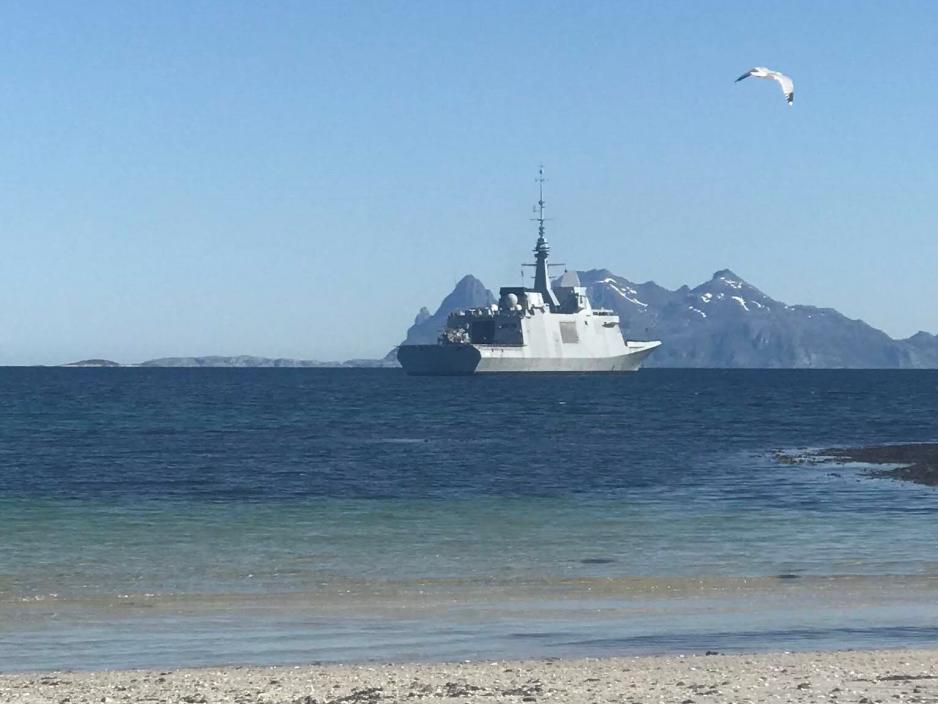Political Predictability Going Down the Drain

French frigate Aquitaine sailing past Bodø, Norway last Wednesday afternoon. The vessel is north bound. (Photo: Private)
Commentary: Icbreakers with cruise missiles, and American and Russian warships sailing the Barents Sea. Monitoring the militarization of the Arctic is a demanding exercise, in particular after predictability went down the drain when Donald Trump assumed the role as President of the United States.
Early March, to pick a starting point, American Admiral James Foggo asked rhetorically: “Who would equip icebreakers with cruise missiles?”
The answer back then was Russia.
Icebreakers with missiles
That was not really news; Russia had equipped the icebreaker ‘Ivan Papanin’ with eight cruise missiles back in 2018.
If Admiral Fogg had asked the same question today, three months later, he would have had to add another country to that list.
His own.
Because while Donald Trump has decided to weaken NATO’s strength of defense in Europe, he has also launched an elaborate plan for construction of American nuclear icebreakers.
10,000 soldiers out from German, in comes a presidential proposal to equip the new icebreaker fleet with “adequate weaponry”.
US warships sailed the Barents Sea recently for the first time since the Cold War.
One exercise follows the next
A few days ago, the Russian cruiser ‘Marshal Ustinov’ sailed in to the Barents Sea to practice missile attacks, according to Russian news agency TASS. Together with the Russian marine destroyer ‘Vice Admiral Kulakov’ they are to monitor a French frigate of the Aquitaine class in the same ocean area, according to Russian news outlets.
The list of military activity in the Arctic is much longer. One military exercise replaces the other.
I have been present at quite a few Arctic meeting places over the years. The meetings are started and closed with a description of, or a plea for, if you will, a peaceful Arctic.
In the Arctic Council, a joint forum for eight Arctic states, this postulate holds the honorary position in any description of the situation in the High North. Security politics is not a part of the Council’s mandate.
Arctic diplomacy is replaced with weapon force
Canada took an early initiative to bring security policy into the Arctic Council, but later relinquished. For the past two years, however, both Swedish and Finnish politicians have argued the same.
The USA, that does what it wants regardless, used the latest Ministerial Meeting of the Arctic Council to lash out with its aggressive security policy, quite outside the mandate of the Council.
Arctic Council silent as a stone
There are also regularly alternative proposals to establish a separate security policy forum outside the Arctic Council.
Norway has continuously argued that security politics should be left at the door of the Arctic Council. Only in this way will the Council be able to continue cooperation between the Arctic states in a time when international cooperation is torn to pieces like paper planes.
That is still a wise standpoint.
Changing the mandate would take years, and also give Donald Trump an excuse for withdrawing the USA from the Arctic Council.
Right now, the Arctic Council sits completely still and watches military activity escalate in its very own garden. Traditional meeting places between Arctic politicians are closed due to Corona, whereas the warships that sail the northern seas are very real. There is an arms race and military muscles are flexed. Even the life-saving and civilian part of Arctic preparedness, the icebreakers, are transformed into war machines.
Life-saving icebreakers are turned into war machines
All is as it was
The Norwegian Ministry of Foreign Affairs is finalizing its new whitepaper about the High North. This is a tricky exercise in a world where the two most powerful states in the Arctic replace Arctic diplomacy with the power of weapons.
Other than that, all is as it was.
In order to alleviate the economic effects of the Corona situation, the Norwegian government has, along with the Progress Party, decided that tearing down road toll stations is an efficient measure. A serious crisis is reduced to a political came modeled on the USA.
On the other hand, any proposal increasing climate gas emissions will accelerate ice melting in the Arctic.
Eventually, we will not need icebreakers
This commentary was originally published in Norwegian and has been translated by HNN's Elisabeth Bergquist.

